
The Beer Hall Putsch, also known as the Munich Putsch, was a failed coup d'état by Nazi Party leader Adolf Hitler, Generalquartiermeister Erich Ludendorff and other Kampfbund leaders in Munich, Bavaria, on 8–9 November 1923, during the Weimar Republic. Approximately two thousand Nazis marched on the Feldherrnhalle, in the city centre, but were confronted by a police cordon, which resulted in the deaths of 15 Nazis, four police officers, and one bystander.
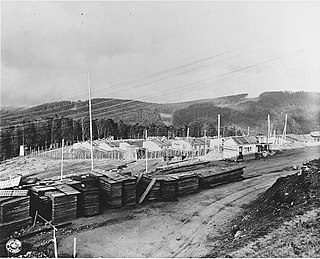
Natzweiler-Struthof was a Nazi concentration camp located in the Vosges Mountains close to the villages of Natzweiler and Struthof in the Gau Baden-Alsace of Germany, on territory annexed from France on a de facto basis in 1940. It operated from 21 May 1941 to September 1944, and was the only concentration camp established by the Germans in the territory of pre-war France. The camp was located in a heavily-forested and isolated area at an elevation of 800 metres (2,600 ft).

Landsberg Prison is a penal facility in the town of Landsberg am Lech in the southwest of the German state of Bavaria, about 65 kilometres (40 mi) west-southwest of Munich and 35 kilometres (22 mi) south of Augsburg. It is best known as the prison where Adolf Hitler was held in 1924, after the failed Beer Hall Putsch in Munich, and where he dictated his memoirs Mein Kampf to Rudolf Hess.

The Auschwitz trial began on November 24, 1947, in Kraków, when Poland's Supreme National Tribunal tried forty former staff of the Auschwitz concentration camps. The trials ended on December 22, 1947.
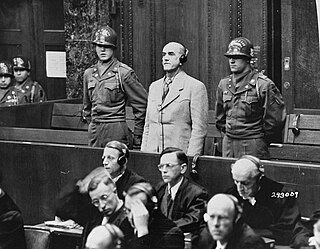
The Pohl trial against the Nazi German administration of the "Final Solution" was the fourth of the thirteen trials for war crimes that the United States authorities held in their occupation zone in Germany in Nuremberg after the end of World War II. The thirteen trials were all held before U.S. military courts, not before the International Military Tribunal, although both courts presided in the same rooms at the Palace of Justice. They are known collectively as the "Subsequent Nuremberg Trials" or more formally, as the "Trials of War Criminals before the Nuremberg Military Tribunals" (NMT).

The People's Court was a Sondergericht of Nazi Germany, set up outside the operations of the constitutional frame of law. Its headquarters were originally located in the former Prussian House of Lords in Berlin, later moved to the former Königliches Wilhelms-Gymnasium at Bellevuestrasse 15 in Potsdamer Platz.

The Dachau trials, also known as the Dachau Military Tribunal, handled the prosecution of almost every war criminal captured in the U.S. military zones in Allied-occupied Germany and in Allied-occupied Austria, and the prosecutions of military personnel and civilian persons who committed war crimes against the American military and American citizens. The war-crime trials were held within the compound of the former Dachau concentration camp by military tribunals authorized by the Judge Advocate General of the U.S. Third Army.
The Mauthausen-Gusen camp trials were a set of trials of SS concentration camp personnel following World War II, heard by an American military government court at Dachau. Between March 29 and May 13, 1946, and then from August 6 to August 21, 1947, a total of 69 former camp personnel were tried. Among them were some of the former guards at the Mauthausen-Gusen concentration camp system and August Eigruber, a former Gauleiter of Upper Austria.

The government of Nazi Germany was a totalitarian dictatorship governed by Adolf Hitler and the Nazi Party according to the Führerprinzip. Nazi Germany was established in January 1933 with the appointment of Adolf Hitler as Chancellor of Germany, followed by suspension of basic rights with the Reichstag Fire Decree and the Enabling Act which gave Hitler's regime the power to pass and enforce laws without the involvement of the Reichstag or German president, and de facto ended with Germany's surrender in World War II on 8 May 1945 and de jure ended with the Berlin Declaration on 5 June 1945.

The Stutthof trials were a series of war crime tribunals held in postwar Poland for the prosecution of Stutthof concentration camp staff and officials, responsible for the murder of up to 85,000 prisoners during the occupation of Poland by Nazi Germany in World War II. None of the Stutthof commandants were ever tried in Poland. SS-Sturmbannführer Max Pauly was put on trial by a British military court in Germany but not for the crimes committed at Stutthof; only as the commandant of the Neuengamme concentration camp in Hamburg. Nevertheless, Pauly was executed in 1946.

Josias, Hereditary Prince of Waldeck and Pyrmont was the heir apparent to the throne of the Principality of Waldeck and Pyrmont and a general in the SS. From 1946 until his death, he was the head of the Princely House of Waldeck and Pyrmont. After World War II, he was sentenced to life in prison at the Buchenwald Trial for his part in the "common plan" to violate the Laws and Usages of War in connection with prisoners of war held at Buchenwald concentration camp, but was released after serving about three years in prison.

General der Flieger was a General of the branch rank of the Luftwaffe in Nazi Germany. Until the end of World War II in 1945, this particular general officer rank was on three-star level (OF-8), equivalent to a US Lieutenant general.
The SS command of Auschwitz concentration camp refers to those units, commands, and agencies of the German SS which operated and administered during World War II. Due to its large size and key role in the Nazi genocide program, the Auschwitz Concentration Camp encompassed personnel from several different branches of the SS, some of which held overlapping and shared areas of responsibility.
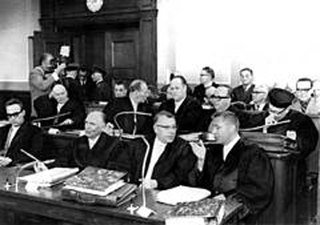
The Sobibor trial was a 1965–66 judicial trial in the West German prosecution of SS officers who had worked at Sobibor extermination camp; it was held in Hagen. It was one of a series of similar war crime trials held during the early and mid-1960s, such as the 1961 trial of Adolf Eichmann by Israel in Jerusalem, and the Frankfurt Auschwitz Trials of 1963–65, also held in West Germany. These trials heightened general public and international understanding of the extent of the crimes that had been perpetrated in occupied Poland some twenty years earlier by Nazi bureaucrats and persons acting as their executioners.
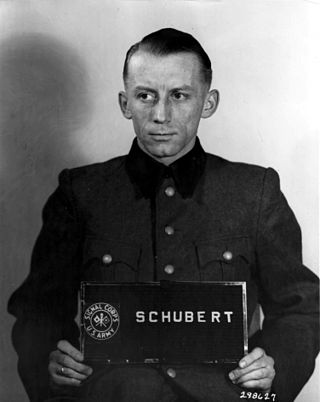
Heinz Hermann Schubert was a German SS officer. He held the rank of Obersturmführer. He was sentenced to death at the Einsatzgruppen Trial in 1948, which was later commuted to 10 years' imprisonment.
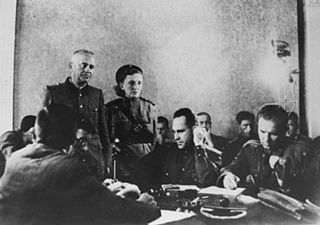
The Majdanek trials were a series of consecutive war-crime trials held in Poland and in Germany during and after World War II, constituting the overall longest Nazi war crimes trial in history spanning over 30 years. The first judicial trial of Majdanek extermination camp officials took place from November 27, 1944, to December 2, 1944, in Lublin, Poland. The last one, held at the District Court of Düsseldorf began on November 26, 1975, and concluded on June 30, 1981. It was West Germany's longest and most expensive trial, lasting 474 sessions.













